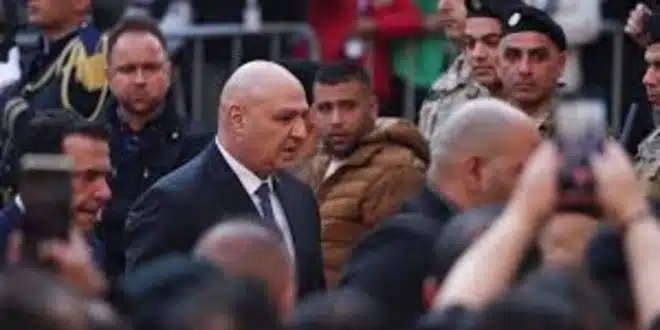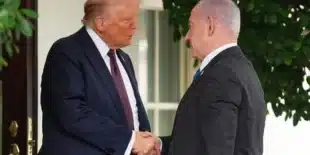President Joseph Aoun on Monday strongly defended Lebanon’s army and security forces after criticism arose over their handling of a Hezbollah-linked light display projected onto Beirut’s iconic Raouche rock. The projection, which featured images of the group’s former longtime leader, sparked political backlash despite prior government warnings against such displays.
Government Objections to the Display
Ahead of the event, Prime Minister Nawaf Salam issued a formal circular reminding authorities of the importance of protecting national landmarks from partisan or political exploitation. The directive highlighted “the recent recurrence of the exploitation of national monuments for propaganda purposes” and instructed public agencies to block any attempts to use public spaces, historic sites, or symbolic landmarks without proper authorization.
Despite the circular, the light show went ahead. Interior Minister Ahmad al-Hajjar later explained that halting the event was not feasible due to the overwhelming number of Hezbollah supporters gathered at the site. The incident reignited debate about the role of state institutions in regulating political activities tied to powerful factions.
Aoun and Berri Emphasize the Army’s Neutral Role
Responding to mounting criticism, President Aoun stressed that safeguarding national peace takes precedence over all other concerns and underscored the army’s central role in maintaining stability. “The army and security forces are fully committed to achieving this goal,” he said, warning that attacks on their credibility were unacceptable. “They are a red line.”
His remarks were echoed by Parliament Speaker Nabih Berri, a Hezbollah ally, who reiterated the military’s importance as a unifying institution. In comments published by al-Joumhouria newspaper, Berri emphasized: “The army is not for one party against the other. The army is for all the Lebanese.”
Broader Implications for Stability
The controversy over the Raouche projection underscores Lebanon’s ongoing struggle to balance freedom of expression with the need to protect national unity. Landmarks like Raouche carry deep cultural significance, and their politicization risks inflaming tensions in an already fragile political climate.
By calling the army a “red line,” both Aoun and Berri sought to reaffirm the institution’s neutrality at a time when divisions between Lebanon’s political factions remain sharp. The army, long viewed as one of the country’s few stabilizing forces, is once again being positioned as a cornerstone of national cohesion amid escalating disputes.


